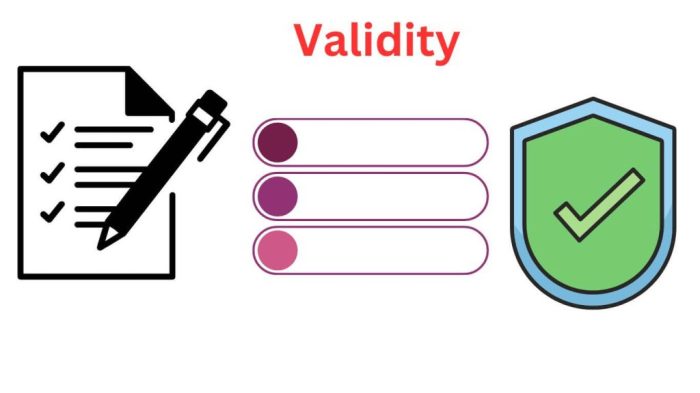The ability of a research study or psychological instrument to accurately measure a phenomenon is crucial in ensuring the credibility and usefulness of research findings. This article delves into the key concepts of validity, reliability, and generalizability, exploring their importance and the factors that influence them in both research studies and psychological instruments.
Understanding these concepts is essential for researchers, practitioners, and anyone interested in evaluating the quality and trustworthiness of research.
1. Research Study: The Ability Of A Research Study Or Psychological Instrument

A research study is a systematic investigation that aims to answer a research question or test a hypothesis. It involves collecting data, analyzing it, and drawing conclusions. The components of a research study include the research question or hypothesis, the research design, the sample, the data collection methods, and the data analysis methods.
The ability of a research study to accurately measure a phenomenon depends on several factors, including the validity of the research design, the reliability of the data collection methods, and the representativeness of the sample. Well-designed research studies use appropriate research designs, reliable data collection methods, and representative samples to ensure that the findings are accurate and generalizable.
Examples of Well-Designed Research Studies
- A randomized controlled trial that tests the effectiveness of a new drug compared to a placebo.
- A longitudinal study that follows a group of participants over time to examine the effects of a particular intervention.
- A cross-sectional study that compares different groups of participants at a single point in time to identify factors associated with a particular outcome.
2. Psychological Instrument

A psychological instrument is a tool used to measure psychological constructs, such as personality traits, cognitive abilities, and mental health symptoms. It typically consists of a set of questions or tasks that are designed to elicit responses that can be interpreted and scored to provide information about the construct being measured.
There are different types of psychological instruments, including self-report questionnaires, projective tests, and performance-based tests. Each type of instrument has its own strengths and weaknesses, and the choice of instrument depends on the specific construct being measured and the research question being asked.
Factors Affecting the Ability of a Psychological Instrument to Accurately Measure a Construct
- The validity of the instrument, which refers to the extent to which it measures what it is intended to measure.
- The reliability of the instrument, which refers to the consistency of its measurements over time and across different raters.
- The standardization of the instrument, which refers to the extent to which it is administered and scored in a consistent manner.
3. Validity
Validity is the extent to which a research study or psychological instrument measures what it is intended to measure. It is an essential aspect of research because it determines the accuracy and trustworthiness of the findings.
Types of Validity
- Face validity:The extent to which an instrument appears to measure what it is intended to measure.
- Content validity:The extent to which an instrument covers the full range of content related to the construct being measured.
- Construct validity:The extent to which an instrument measures the underlying construct that it is intended to measure.
- Criterion validity:The extent to which an instrument correlates with other measures of the same construct or with external criteria.
Factors Affecting Validity
- The clarity of the research question or hypothesis.
- The appropriateness of the research design and data collection methods.
- The representativeness of the sample.
- The quality of the psychological instrument.
4. Reliability

Reliability is the extent to which a research study or psychological instrument produces consistent results over time and across different raters. It is an essential aspect of research because it ensures that the findings are trustworthy and can be replicated.
Types of Reliability
- Test-retest reliability:The extent to which an instrument produces consistent results when administered to the same participants at different points in time.
- Inter-rater reliability:The extent to which different raters produce consistent scores when using the same instrument to assess the same participants.
- Internal consistency:The extent to which the items on an instrument are correlated with each other.
Factors Affecting Reliability
- The clarity of the research question or hypothesis.
- The appropriateness of the research design and data collection methods.
- The representativeness of the sample.
- The quality of the psychological instrument.
5. Generalizability
Generalizability is the extent to which the findings of a research study can be applied to a larger population. It is an essential aspect of research because it determines the usefulness and relevance of the findings.
Factors Affecting Generalizability
- The representativeness of the sample.
- The external validity of the research design.
- The extent to which the findings are consistent with other research studies.
Strategies for Increasing Generalizability, The ability of a research study or psychological instrument
- Using random sampling to select a representative sample.
- Conducting research in multiple settings and with different populations.
- Replicating research findings in different studies.
FAQ Summary
What is the difference between validity and reliability?
Validity refers to the extent to which a research study or psychological instrument measures what it claims to measure, while reliability refers to the consistency of the measurements over time and across different observers.
How can I improve the generalizability of my research findings?
To enhance generalizability, researchers can use random sampling, control for confounding variables, and replicate studies in different contexts.